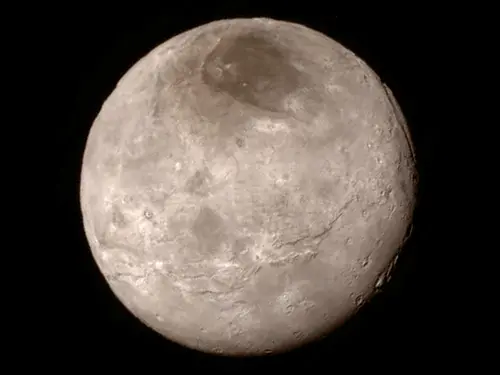
All Stories
Stories of daring, stories of technological feats, stories of prevailing against the odds ... these are the stories we tell at the National Air and Space Museum. Dive in to the stories below to discover, learn, and be inspired.
Showing 1 - 9 of 9

August 01, 2023
How Did We Discover the Planets?
When you look up you can see the stars, the Moon, and sometimes even other planets! We know what these otherworldly objects are because of centuries of research carried out by curious stargazers before us.

June 22, 2018
What an Accidental Discovery Told Us About Pluto
June of this year marks the 40th anniversary of the discovery of Pluto’s largest moon, Charon. At the time of Charon’s discovery, scientists weren’t even looking for it.

August 22, 2015
Inside Look: Celebrating New Horizons With the Mission Team
On July 13 and 14, I was invited to visit the Johns Hopkins University Applied Physics Laboratory in Laurel, Maryland, for the New Horizons Pluto Flyby Events.

August 21, 2015
New Horizons: The Gift That Keeps Giving
On July 14, the New Horizons spacecraft completed a 9.5-year-long, 4.8-billion kilometer (3-billion mile) journey to the object furthest from the Sun to be visited by a spacecraft.

July 10, 2015
First Mission to Pluto: The Difficult Birth of New Horizons
As we await the exciting results of New Horizons’ flyby of Pluto on July 14, it is all too easy to think that this mission was inevitable: the capstone to NASA’s spectacular exploration of all the planets (and ex-planets) of the solar system since the 1960s. Yet, it proved extraordinarily difficult to sustain a Pluto project.

May 14, 2015
Finding Pluto With the Blink Comparator
It all started at a special public lecture at the Museum in July 2014 given by Alan Stern, the lead scientist for the New Horizons mission, which will fly past Pluto this July. Among the attendees was William Lowell Putnam IV, sole trustee of the Lowell Observatory in Flagstaff, Arizona—the place where Pluto was found in 1930 by Clyde Tombaugh. It was an exciting evening, not only to learn about the impending flyby but also having a chance to speak with Putnam and the director of the Lowell Observatory, Jeff Hall.

March 11, 2013
An Artistic Search for Pluto
How do you illustrate a non-fiction book for kids based on the former ninth planet? Some people still have some pretty strong feelings about Pluto’s demotion: protest signs, student protest speeches, public demonstrations. Cries of unfairness could be heard when news of poor Pluto’s removal from the planetary ranks occurred. It is the intention of this new children’s book to set the story straight or at least attempt to share “Pluto’s side of the story." I‘ve worked in the children’s book market as a freelance illustrator for several years in addition to my full-time job with the Museum’s Early Childhood program. My latest book assignment from Abrams Books for Young Readers, Pluto's Secret: an icy World's Tale of Discovery, connected my job as an artist and an educator.

March 08, 2013
Pluto’s Secret: Writing the Museum’s First Children’s Book
How did three staff members at the National Air and Space Museum get to collaborate on the Museum’s first children’s book, Pluto’s Secret: An Icy World’s Tale of Discovery? The short answer is that this is an extraordinary place to work. And when people are as generous with their time and talents as my collaborators have been, neat stuff happens.
February 26, 2013
Vulcan? But that’s not logical…
The news that “Vulcan” topped the poll results taken by the SETI (Search for Extraterrestrial Intelligence) Institute in Mountain View, California as a possible name for one of the two tiny moons newly discovered to be orbiting Pluto has gotten quite a bit of press this week. In 2012, Mark Showalter of SETI, working with scientists on the New Horizons mission sending a probe to Pluto, found a tiny fifth moon orbiting the icy world.